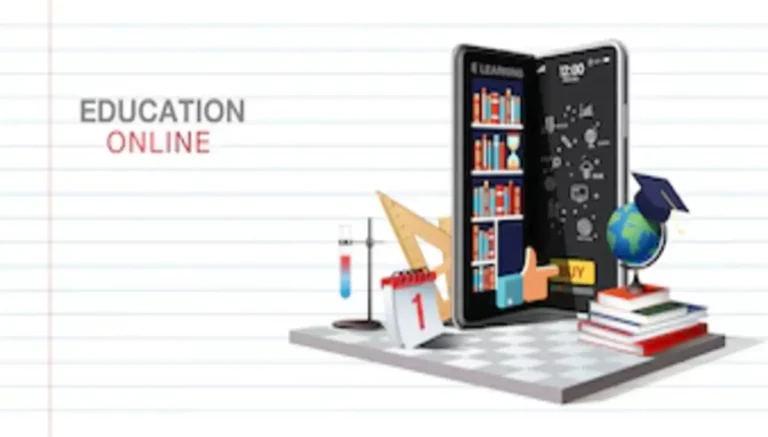
In today’s fast-paced world, technology plays a crucial role in shaping education. Educational apps have become indispensable tools that empower students to take charge of their learning journey. These dynamic digital companions offer a wide array of benefits, from increased engagement to personalized learning experiences. In this article, we’ll explore ten remarkable ways educational apps are transforming the lives of students everywhere.
Educational apps are awesome tools that make learning fun and engaging! They are software applications specifically designed to enhance the educational experience for students of all ages. These apps can be accessed on various devices like smartphones, tablets, and computers, making them super convenient for both students and teachers.
What’s fantastic about these apps is their interactive nature. They don’t just feed you information like a boring old textbook; they create a dynamic learning environment. Many of them use game techniques, turning learning into exciting games and challenges. You can earn points, complete missions, and unlock achievements as you progress, which keeps you motivated and eager to learn more. One of the best things about educational apps is their adaptability. They understand that every student is unique and has different learning preferences. So, they offer personalized learning paths based on your strengths and weaknesses. This means you get to learn at your own pace and focus on the areas you need help with the most. No more feeling left behind or bored because you’re way ahead!
And guess what? Educational apps also encourage collaboration and peer-to-peer learning. You can connect with other students using the same app, work on group projects, or discuss challenging concepts together. It’s like having a study buddy or a whole class right there with you, even if they’re miles away.
These apps are continuously evolving too. Developers are always adding new content, updating information, and improving features. So, you’ll never run out of exciting things to learn or fresh challenges to tackle.
10 Ways Educational apps help students
Interactive Learning
Educational apps go beyond traditional textbooks and lectures by incorporating interactive elements. These can include quizzes, puzzles, simulations, and interactive exercises. By actively participating in the learning process, students are more likely to retain information and develop a deeper understanding of the subject matter. For example, in a language learning app, users might engage in conversational practice with AI chatbots, improving their language skills through realistic interaction.
Personalized Learning
Educational apps often use algorithms to assess a user’s strengths and weaknesses. Based on this assessment, the app can tailor the content and difficulty level to match the individual’s proficiency. This personalized approach helps learners progress at their own pace, preventing boredom from material that is too easy or frustration from material that is too challenging.
Accessible Anytime, Anywhere
One of the most significant advantages of educational apps is the ability to access learning materials 24/7, regardless of location. Students can learn on their smartphones, tablets, or computers, making education more flexible and accommodating to their busy schedules. This accessibility is especially beneficial for those who cannot attend traditional classes due to work, family commitments, or geographic constraints.
Rich Multimedia Content
Educational apps often incorporate multimedia elements like videos, animations, and audio clips to enhance the learning experience. These visual and auditory aids can simplify complex topics, making them more engaging and easier to comprehend. For instance, a science app might include interactive 3D models to help students see and understand complex molecular structures.
Immediate Feedback
With educational apps, learners receive instant feedback on their performance in quizzes, assignments, and exercises. This real-time feedback allows students to identify their mistakes, grasp concepts more effectively, and rectify errors promptly. Moreover, it reduces the need for manual grading, saving time for both learners and educators.
Track Progress Easily
Educational apps often have built-in progress-tracking features that allow users to monitor their learning journey. Students can view their performance over time, track the completion of lessons or modules, and assess their improvement. This feature helps learners stay motivated and provides valuable insights into their learning patterns.
Cost-Effective
Educational apps can be more affordable than traditional textbooks and courses. By replacing physical materials with digital content, these apps significantly reduce costs for both students and educational institutions. Additionally, some educational apps offer free versions with optional in-app purchases, providing access to basic content without a financial burden.
Up-to-Date Content
Educational apps can be quickly updated to include the latest information, research findings, and trends in various fields. Unlike printed textbooks that might become outdated, digital content allows for real-time updates, ensuring that learners have access to the most current knowledge and advancements.
Promotes Independent Learning
Educational apps foster a self-directed learning approach. Users can choose what and when to study, allowing them to explore topics of interest outside the conventional curriculum. This independence nurtures a sense of responsibility and ownership over one’s education, leading to a deeper and more lasting understanding of the subject matter.
Saves Time
Educational apps streamline the learning process by providing organized content in one place. Learners don’t need to spend time searching for relevant materials or flipping through pages. The ability to access targeted information quickly allows students to make the most of their study time and focus on their academic goals more efficiently.
Top Educational Apps
Duolingo
Language learning has never been more fun and accessible with Duolingo. This award-winning app offers interactive lessons in over 30 languages. Its gamified approach encourages users to progress through levels, earning rewards and staying motivated to master a new language.
Khan Academy
Khan Academy is a free, nonprofit app that revolutionizes the way students learn various subjects. With thousands of video lessons and practice exercises, it covers subjects ranging from mathematics and science to arts and humanities. Its adaptive learning system ensures personalized learning for every user.
Coursera
For those seeking college-level courses from prestigious universities, Coursera is a top choice. This app provides online courses taught by experts in fields like computer science, business, data science, and more. Learners can access lectures, and assignments, and even earn certifications.
Udemy
Udemy is a vast online learning marketplace offering courses in nearly every subject imaginable. Whether you want to improve your coding skills or learn photography, Udemy provides a diverse range of courses taught by industry professionals.
Google Arts & Culture
Explore the world’s artistic and cultural heritage with Google Arts & Culture. This app allows users to virtually tour museums, access high-resolution artworks, and learn about historical events and cultural icons.
Quizlet
Learning becomes more engaging with Quizlet, a user-friendly flashcard app. Create your flashcards or choose from millions of existing sets to study various topics, from language vocabulary to scientific terms.
LinkedIn Learning
LinkedIn Learning provides a vast library of video courses to enhance professional skills. From leadership and communication to software proficiency, users can access content to stay compedevelopmenttitive in their careers.
Udacity
Targeting individuals seeking to advance their careers, Udacity focuses on tech-related courses in fields like artificial intelligence, data science, web, and more. The app’s nano degree programs provide hands-on projects and mentorship to help learners excel in their chosen career paths.
Understanding Digital Literacy
Digital literacy includes the ability to use digital technologies effectively and confidently to achieve various goals. It goes beyond mere technical know-how, as it involves critical thinking, information management, and an understanding of online safety and privacy. Digital literacy enables individuals to navigate the vast online landscape with ease, enabling them to access, evaluate, and utilize digital resources in a meaningful way.
Boosting Communication and Collaboration
The digital realm has changed the way we communicate and collaborate. Social media platforms, instant messaging, and video conferencing tools have bridged the geographical gaps, enabling connections worldwide. Digital literacy allows us to harness these technologies efficiently, fostering meaningful relationships with friends, family, colleagues, and clients. Whether it’s a virtual meeting or an online project collaboration, digital literacy streamlines communication channels and boosts productivity.
Access to Information and Knowledge
The internet is a treasure trove of information, providing us with an abundance of knowledge at our fingertips. However, using this vast sea of data requires digital literacy skills to differentiate between reliable sources and misinformation. By cultivating digital literacy, students can critically evaluate information, fact-check sources, and stay updated with the latest developments in their fields of interest. In today’s era of fake news and misinformation, digital literacy is an indispensable shield against falling victim to falsehoods.
Enhancing Educational Opportunities
Digital literacy plays a pivotal role in modern education. From online courses to interactive learning platforms, technology has changed the way we learn. Embracing digital literacy empowers students and educators to explore new horizons beyond the traditional classroom setting. It fosters self-directed learning and equips learners with valuable skills for the job market, where digital competence is increasingly in demand.
Empowering Professional Growth
In the digital economy, proficiency with digital tools and platforms is no longer an optional skill but a prerequisite for career advancement. Many industries are undergoing digital transformations, and job roles are evolving accordingly. Digital literacy empowers employees to adapt to these changes, making them more valuable assets to their organizations. Whether it’s data analysis, content creation, or project management, digital literacy opens doors to a myriad of career opportunities.
Merging Educational Apps with Digital Literacy
Educational apps and digital literacy go hand in hand, as these apps play a pivotal role in promoting and enhancing digital literacy among learners of all ages. Let’s explore how educational apps relate to and contribute to the development of digital literacy:
Familiarity with Digital Tools
Educational apps introduce students to various digital tools and technologies, such as tablets, smartphones, and computers. By using these apps, learners become familiar with touch-screen interactions, navigating user interfaces, and using different functionalities, thus building the foundation for digital proficiency.
Information Access and Evaluation
Educational apps provide access to a vast range of educational content and resources. Students can explore interactive textbooks, videos, simulations, and online libraries to expand their knowledge. However, with this abundance of information, digital literacy becomes crucial in teaching learners how to evaluate sources, determine credibility, and differentiate between reliable information and misleading content.
Digital Research Skills
Educational apps often require students to research topics, encouraging them to use search engines effectively. Learning how to perform targeted searches, use appropriate keywords, and critically assess search results are essential components of digital literacy that students can develop while using these apps.
Online Safety and Privacy
Many educational apps require user accounts or personal information to track progress and provide personalized learning experiences. By using these apps, learners can become more aware of online safety practices, data protection, and the importance of safeguarding their personal information in the digital realm.
Adaptability to New Technologies
The world of technology is constantly evolving, with new tools and apps emerging regularly. Educational apps encourage students to adapt to these changes, helping them stay updated with the latest advancements in digital technologies. This adaptability is a crucial aspect of digital literacy in a rapidly evolving digital landscape.
Interactive Learning
Educational apps often offer interactive learning experiences, engaging students in problem-solving, critical thinking, and decision-making activities. These engagements help students develop the analytical skills necessary for processing information and making informed decisions in their digital lives.
Empowering Self-directed Learning
Many educational apps are designed to facilitate self-paced learning, enabling students to take control of their educational journey. Digital literacy is essential for students to navigate through these apps independently, set learning goals, and manage their progress effectively.
Educational apps serve as valuable tools to promote digital literacy among learners. Through these apps, students develop essential digital skills, such as information, online safety, and adaptability to new technologies. As technology continues to shape the educational landscape, integrating educational apps with digital literacy initiatives is crucial for equipping students with the skills they need to succeed in the digital world.



